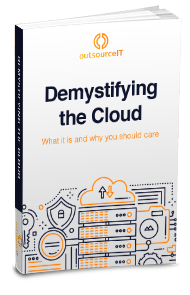The cloud is an effective and cost-efficient tool that makes it easy for small- and medium-sized businesses (SMBs) to manage workloads, obtain valuable insights from massive amounts of data, and gain a competitive advantage. The pandemic has given rise to widespread cloud adoption, but some SMBs were so keen on quickly resuming operations that they failed to take into account the security and compliance of their data in the cloud.
Let’s uncomplicate the cloud!
Learn more about it from our FREE eBook: Demystifying the Cloud: What it is and why you should care.
According to a report by cybersecurity firm Netskope, in the second quarter of 2021, 68% of malware downloads were delivered from cloud apps. This proves that privacy and security should be primary concerns when storing data in the cloud. Listed below are some cloud compliance tips every SMB should know.
Identify relevant data security regulations
Before implementing any cloud solutions, it’s best to identify the relevant local laws, global standards, and industry policies your organization must comply with when it comes to handling data. Here are some examples:
- Health Insurance Portability and Accountability Act of 1996 (HIPAA) – HIPAA is a federal law that primarily applies to healthcare providers and organizations, and their business associates. Its goal is to protect sensitive patient health information from being accessed and used without the patient's consent or knowledge.
- Family Educational Rights and Privacy Act (FERPA) – FERPA is a federal law that controls access to students’ educational information and records by public entities like potential employers, publicly funded educational institutions, and foreign governments.
- Financial Industry Regulatory Authority (FINRA) Rules – FINRA is an independent, nongovernmental organization that develops and enforces rules that govern security firms, registered brokers, and broker-dealer firms in the United States. These rules are implemented to safeguard investors against fraud and ensure ethical conduct within the financial industry.
- Payment Card Industry Data Security Standard (PCI DSS) – PCI DSS provides operational guidelines and technical requirements that aim to ensure the security of credit card transactions and cardholder data. These security standards apply to organizations that process payment transactions, as well as software developers and manufacturers that create programs, apps, and devices utilized in such transactions.
- The Sarbanes-Oxley (SOX) Act of 2002 – SOX comprises rules and enforcement policies that protect investors from accounting errors and fraudulent financial practices by corporations.
- Gramm-Leach-Bliley Act (GLBA) – GLBA is also known as the Financial Modernization Act of 1999. It requires financial institutions to inform their customers how they disclose sensitive information, notify customers that they have the right to opt out if they prefer not to share their private data to third parties, and implement security measures to protect the data they collect.
- Customs-Trade Partnership Against Terrorism (C-TPAT) – Designed by the US Customs and Border Protection, C-TPAT is a program that is focused on strengthening the security of supply chains. It requires member companies to implement certain security procedures to protect against terrorist infiltration and other illegal activities.
Noncompliance may not only result in potential charges and hefty fines, but it can also negatively impact your business operations and reputation as a whole.
Update outdated infrastructure and security measures
Outdated cloud infrastructures, applications, processes, and security systems can make an SMB vulnerable to cyberattacks and data breaches. This is because it’s likely that these technologies are no longer provided with critical security updates and don’t meet the latest compliance requirements. The best course of action is to upgrade, replace, or invest in additional security products and services to remain compliant with current data security regulations.
Partnering with a trusted and experienced managed IT services provider (MSP) like outsourceIT can make this task less daunting. Aside from providing IT and cloud services, an MSP can also help businesses assess their current IT infrastructure and processes, and determine if these no longer meet business needs or strategic objectives. On top of that, an MSP can monitor and recommend solutions that will enable businesses to stay secure and compliant.
Educate employees
Even if your cloud infrastructure meets compliance requirements, it is essential to implement robust security training for your employees. Cybersecurity experts and several studies have established that uninformed individuals will most likely put your company’s data at risk by falling victim to threats like phishing scams, ransomware, and the like. IT research and advisory company Gartner predicts that “through 2025, 90% of the organizations that fail to control public cloud use will inappropriately share sensitive data.”
Related reading: 5 Tips for ensuring the safety of your cloud-based data
Falling behind on cloud security and compliance is something you wouldn't want to happen. At outsourceIT, we offer reliable and secure cloud services that can cater to your cloud compliance needs. Our cloud and security experts are here to help. Call us today for a FREE consultation.


